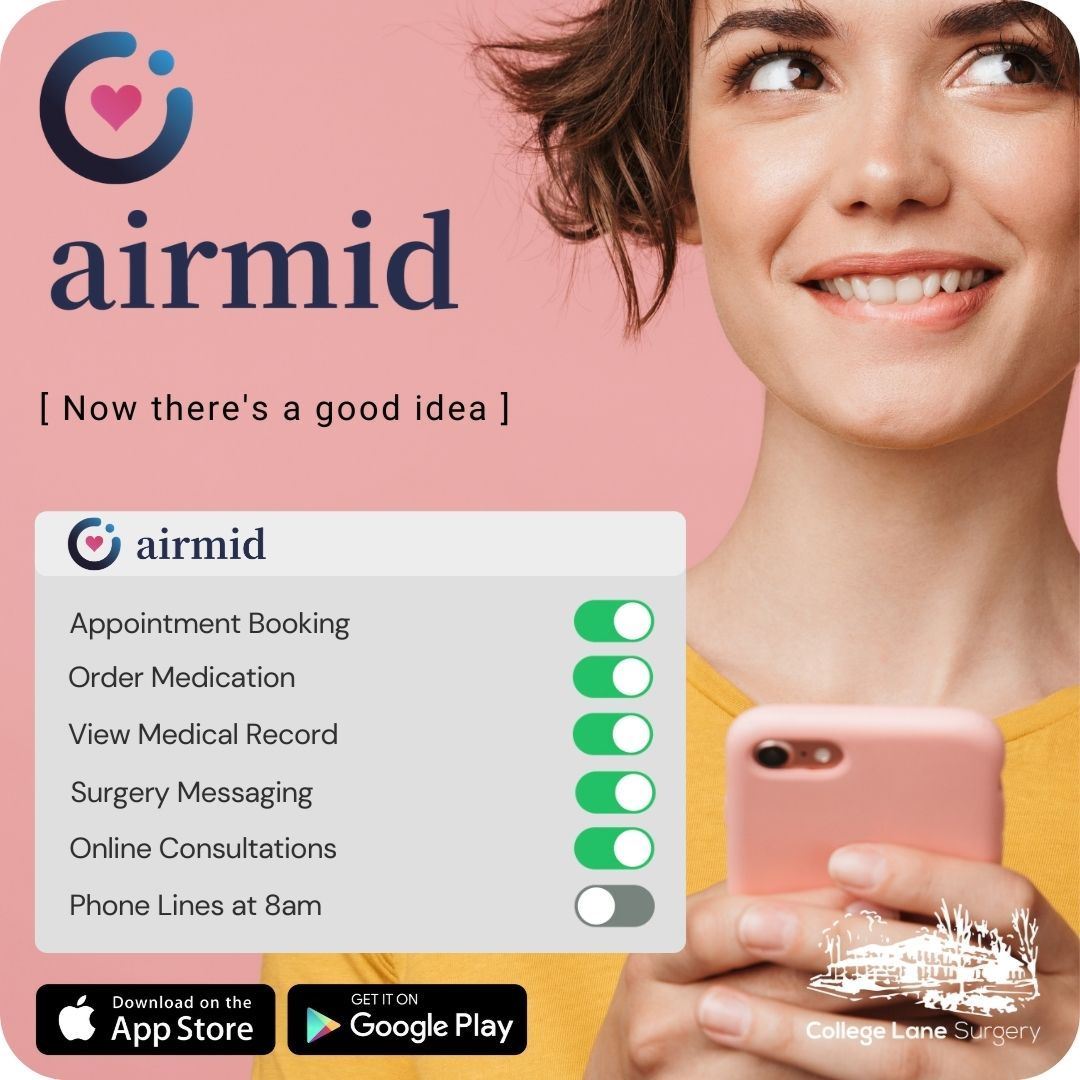Prescriptions

The Surgery would like to invite you to use the Airmid App to order your medications
The new, simple and secure way to access a range of NHS services on your smartphone or tablet.
What does the App do?
Use the App to:
- check your symptoms
- find out what to do when you need help urgently
- book and manage appointments at your GP surgery
- order repeat prescriptions
- order acute or non regualr medications you've had in the last 3 months
- view your GP medical record securely
- register to be an organ donor
- choose how the NHS uses your data
To see how to order your medication on the app click here
Repeat Prescriptions
We want to make it as easy as possible for patients to order their usual medication. You don't need an appointment to see the GP to get further supplies of your repeat or continuous medicines. The best way to request more of your medication is through the Airmid App
We cannot take prescription requests over the phone or at reception due to patient safety concerns raised by NHS England and the CQC. Issuing prescriptions requires training and concentration without interruptions to avoid errors.
If over 65 or housebound, call 01484 500921 and select option 4 to reach our 24/7 prescription line.
All others must request refills online, via the Airmid/NHS app, with a pharmacy form, or by completing a handwritten form at reception. We apologise for the inconvenience but these changes are necessary to ensure prescription accuracy and safety.
You can request a repeat prescription in a number of ways:
- Request a repeat prescription in writing from reception
- Request a repeat prescription online using the website or an App
- Request a repeat prescription by post (we will be happy to post it back to you if you enclose a stamp addressed envelope)
For step by step instructions of how to order medication using our website click here
Please allow 48 hours, excluding weekends and Bank Holidays, for your request to be processed. Any problems please telephone the surgery.
Prescriptions ordered during working hours will usually be sent to your chosen pharmacy after 14:00 the following working day. Your pharmacy may not have it ready to collect immediately so please check with them before going to collect to avoid disappointment.
Prescriptions ordered while the surgery is closed (18:00) will not start to be processed until the next working day so may take an extra day before they are sent to your pharmacy.
To check if the pharmacy have recieved your prescription, please check the Airmid App or ring your pharmacy.
Electronic Prescribing Service
This practice is set up for the electronic prescription service. This means that for most items we can send your prescription to your chosen chemist directly saving you having to come down to the surgery.
Let your local pharmacy know and they will add a nomination so that your prescriptions go there automatically. We do not add pharmacy nominations as that is between you and your pharmacy to agree. Read more about the Electronic Prescription Service EPS on the NHS website.
Repeat Dispensing
If you are on regular, stable, medication we can provide a service in partnership with your pharmacy called Repeat Dispensing. This means you will order your medication once every 6 or 12 months and your pharmacy hold the prescriptions for you and dispense as you need them. At the end of that period you would have a blood test, blood pressure check and a medication review and then we can re-issue again. Please ask if you are suitable for this service or watch the video to the right or click here to learn more.
Find a pharmacy - NHS (www.nhs.uk)
Accessing Pharmacy First services
The following table shows the 7 conditions pharmacists can manage across various age ranges.
| Clinical pathway | Age range |
| Acute otitis media* | 1 to 17 years |
| Impetigo | 1 year and over |
| Infected insect bites | 1 year and over |
| Shingles | 18 years and over |
| Sinusitis | 12 years and over |
| Sore throat | 5 years and over |
| Uncomplicated urinary tract infections | Women 16-64 years |
Prescription Fees
Help with NHS costs
In England, around 90% of prescription items are dispensed free. This includes exemptions from charging for those on low incomes, such as:
- those on specific benefits or through the NHS Low Income Scheme
- those who are age exempt
- those with certain medical conditions
- More information is available at NHS Choices
Are You Claiming free prescriptions? Check before you tick...
Find out if you're entitled to free NHS prescriptions, NHS dental treatment and help with other NHS costs using our eligibility checker.
It usually takes 3 minutes to check.
If you claim free NHS prescriptions or NHS dental treatment when you're not entitled, you could face a £100 penalty charge. Even if it's by mistake.
NHS Charges
These charges apply in England only. In Northern Ireland, Scotland and Wales prescriptions are free of charge.
- Prescription (per item): £9.65 (rising to £9.90 01/05/24)
- 12-month prepayment certificate (PPC): £111.60 (rising to 114.50 from 01/05/24)
- 3-month PPC: £31.25 (rising to £32.01 from 01/05/24)
If you will have to pay for four or more prescription items in three months or more than 14 items in 12 months, you may find it cheaper to buy a PPC.
- Telephone advice and order line 0845 850 0030
- General Public - Buy or Renew a PPC On-line
Some health conditions mean you are exempt from prescription charges. If you require a Medical Exemption Form you can collect one at reception. Upon receipt, the GP will sign and stamp the form and send it in the post. You will then receive your exemption card within 14 working days. For more information about who is entitled to Medical Exemption from prescription charges please visit the NHS website here..

More Affordable HRT
On 1 April 2023, a new Prescription Prepayment Certificate (PPC) will be introduced to reduce the cost of hormone replacement therapy (HRT). If you are prescribed HRT, check if an HRT PPC will be more suitable for you. It covers an unlimited number of listed HRT medicines. Find more information on the Hormone Replacement Therapy Prescription Prepayment Certificate page.
Medication for patients having MRI scans and other investigative procedures
After very careful consideration, Rose Medical Practice have decided to no longer prescribe diazepam for patients having MRI scans or other investigative procedures from 1st July 2023. This is not a decision we took lightly; we have a duty of care to provide safe, consistent, and appropriate care for our patients. We hope the reasons outlined below help to explain our main concerns.
- Small doses of benzodiazepines such at 2mg diazepam are probably sub-therapeutic for most adults for any effective sedation. Conversely anxiolytics can have an idiosyncratic response in patients, and even very small doses can cause increased agitation in some subsets of patients.
- A patient may take a sedative ‘an hour’ before their assumed procedure, to then attend the hospital to find their procedure has been delayed, therefore the timing of the anxiolytic being sub optimal.
- GPs are not regularly involved, skilled, trained or appraised in sedation skills.
- All hospital consultants, both those requesting imaging and those providing it, have access to the same prescribing abilities as GPs. If a patient needs a certain medication to enable an investigation to go ahead, they are just as well positioned to provide a prescription, either through the hospital pharmacy or a hospital FP10.
- Sedated patients should be regularly monitored, and we have been made aware of a case where a GP provided sedative was given, the patient not monitored, and subsequently had a respiratory arrest in an MRI machine.
- The Royal College of Radiologists‘ own guidelines on sedation for imaging makes no mention of GP involvement or provision of low dose anxiolytics and stresses the importance of experienced well-trained staff involved and the monitoring of sedated patients.
You may wish to discuss this with your radiologist or consultant regarding the next steps. Feel free to show them this policy.
Further Information
For more information, please see the following patient information leaflet published by the Royal College of Anaesthetists:
The following links provide further information:
Sedation, analgesia and anaesthesia in the radiology department – Royal College of Radiologists
Sedation, analgesia and anaesthesia in the radiology department
Safe Sedation Practice for Healthcare Professionals: Standards and Guidance – Academy of Medical Royal Colleges
ADHD Shared Care Prescribing
At Rose Medical Practice, we are committed to providing comprehensive and equitable healthcare to all our patients. With this guiding principle in mind, we have recently undertaken a review of our policies regarding the management of Attention Deficit Hyperactivity Disorder (ADHD) and the prescribing of ADHD medications. Our decision to update our ADHD SCA (Shared care Agreement) Policy and prescribing practices stems from a conscientious effort to align with the latest guidance from the Medicines Management Team and British Medical Association.
Central to our updated policy is the understanding that equitable access to care is paramount. Therefore, in accordance with the guidance, we have made the decision to discontinue the practice of prescribing ADHD medication that has been recommended by consultants seen privately. This adjustment ensures that all patients receive consistent and standardised care, regardless of their route to diagnosis or treatment.
It is crucial to recognise that the management of ADHD, particularly through medication, necessitates regular monitoring and specialist oversight. While we remain dedicated to delivering high-quality care to our patients, our resources and capabilities may not extend to providing the specialised monitoring required for patients diagnosed and treated privately.
As such, we kindly request that patients who have received a diagnosis of ADHD through private consultation continue to seek medication prescriptions from their private specialists. This approach ensures that individuals receive the comprehensive care they deserve, tailored to their specific needs and under the supervision of a specialist equipped to provide ongoing support and monitoring.
For patients who may wish to transition to NHS care for their ADHD management, we are here to assist. We encourage those seeking NHS support to initiate contact through our e-consultation platform. Upon receipt of your request, we will facilitate your referral to the appropriate NHS service, ensuring a seamless transition to continued care within the public healthcare system.
At Rose Medical Practice, we are committed to fostering an environment of inclusivity and fairness in healthcare delivery. Our decision to update our ADHD SCA Policy and prescribing practices reflects this commitment, prioritising the well-being and equitable treatment of all our patients.
NICE guidance issued in 2018 on the diagnosis and management of ADHD in adults states; ‘After titration and dose stabilisation, prescribing and monitoring of ADHD medication should be carried out under Shared Care Protocol arrangements with primary care’.
Please kindly note that the Rose Medical Practice does not accept any private shared care agreements.
What is ‘Shared Care’?
A ‘Shared Care Agreement’ or SCA is an agreement between you, your GP, and your psychiatrist. It enables the care and treatment you receive for ADHD to be shared between the psychiatrist and your GP. This will only occur with your agreement and when your ADHD medication is stable.
A shared care agreement is not something a GP is legally bound to sign, it is a ‘professional courtesy’ that GPs often sign to help patients continue to receive care. A GP is fully entitled to refuse a shared care agreement if they are not happy with the burden of responsibility it puts on them, and then the consultant must take full responsibility for prescribing and any necessary monitoring.
If a GP refuses shared care, then ‘appropriate arrangements for the continuing care’ of a patient are warranted, which could mean being passed back to the psychiatric team who made the assessment. What this means for adults with ADHD is that any diagnosis from a private clinic for which a GP refuses to sign a shared care agreement will likely result in the requirement for medications to be issued privately, rather than by the NHS. However, shared care agreements with private healthcare providers when this service is being provided for the patient on behalf of the NHS (such as through the Right to Choose scheme) are common.
The General Medical Council have published ethical guidance on SCAs here.
The British Medical Association have also advised against shared care agreements with private providers;
"Sometimes the care of a patient is shared between two doctors, usually a GP and a specialist, and there is a formalised written ‘shared care agreement’ setting out the position of each, to which both parties have willingly agreed. Where these arrangements are in place, GP providers can arrange the prescriptions and appropriate investigations, and the results are fully dealt with by clinicians with the necessary competence under the shared care arrangement. There is NHS guidance available about this.
Shared Care with private providers is not recommended due to the general NHS constitution principle of keeping as clear a separation as possible between private and NHS care. Shared Care is currently set up as an NHS service, and entering into a shared care arrangement may have implications around governance and quality assurance as well as promoting health inequalities. A private patient seeking access to shared care should therefore have their care completely transferred to the NHS. Shared care may be appropriate where private providers are providing commissioned NHS services and where appropriate shared care arrangements are in place.
All shared care arrangements are voluntary, so even where agreements are in place, practices can decline shared care requests on clinical and capacity grounds. The responsibility for the patient’s care and ongoing prescribing then remains the responsibility of the private provider."
Thank you for your understanding and cooperation as we strive to provide the best possible care to our community.
Urgent medications requested by Hospital
There are no circumstances in which a GP must prescribe urgent medications requested by the hospital. Regardless of what you may have been told at hospital, the hospital itself is responsible for supplying any urgent medications they recommend. They must provide at least 7 days worth of this medication. Failure of the hospital to supply the required urgent medications represents a breach of the hospital contract. See below for further information. *
GPs do prescribe medications requested by the hospital, but these are on a routine basis and require written instructions that are sent to us in the form of typed discharge summaries, outpatient prescriptions or clinic letters. As they are routine requests, they are processed in the normal manner and can take 7 working days.
We do not prescribe medications based on patient request only, without written confirmation from the hospital. This is for clinical safety reasons.
* The following is an extract from the NHS Standard Contract 2024/25, which hospitals must work to, regarding the supply of urgent medication:
11.10 Where a Service User [patient] has an immediate clinical need for medication to be supplied following outpatient clinic attendance, the Provider [hospital] must itself supply to the Service User an adequate quantity of that medication to last for the period required by local practice, in accordance with any requirements set out in the A, CR, MH NHS Standard Contract 2024/25 Service Conditions (Full Length) Transfer of and Discharge from Care Protocols (but at least sufficient to meet the Service User’s immediate clinical needs until the Service User’s GP receives the relevant Clinic Letter and can prescribe accordingly)
Page created: 03 January 2023

